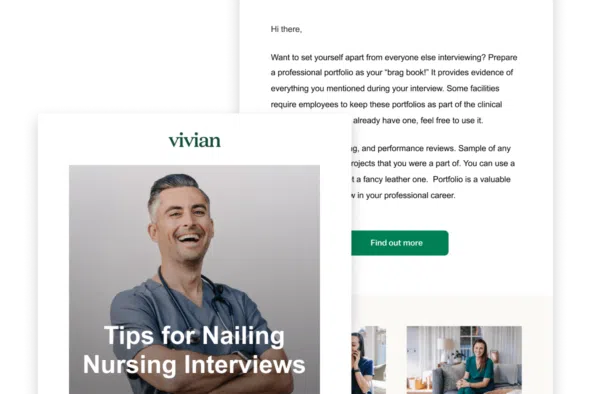Caring for others in distress can take a toll on nurses and other healthcare providers who provide empathy and compassion. Discussing topics such as compassion fatigue and burnout in nursing highlights the critical link between mental well-being and a demanding healthcare profession. It also raises awareness, open conversations and the importance of support systems – all essential components when addressing the mental health challenges nurses may face in their daily work environment.
To help shine a light on the well-being of some of the nation’s healthcare heroes, Vivian Health conducted an exclusive interview with Leanne Burke, EdD, MSN, CNM, RNC-OB, an esteemed Associate Clinical Professional and Pre-Licensure Program Director at the University of California, Irvine (UCI) Sue & Bill Gross School of Nursing. Dr. Burke is an awarded educator and teaches self-compassion and coping strategies to her nursing students. She also serves as an Inaugural Fellow in UCI’s Faculty Academy for Teaching Excellence (FATE), through which she helps faculty incorporate wellness into their teachings. Besides her academic endeavors, Dr. Burke is a Certified Nurse Midwife highly engaged in working with UCI Health and community agencies to minimize disparities in the BIPOC birthing community and improve access to doula support.
Together, we delved into the world of nursing, exploring what compassion fatigue and burnout really mean, what triggers them, and how to identify the warning signs in your colleagues and employees. We also explored the essential steps to take if you or someone you know is teetering on the edge or already grappling with these challenges. Within our Q&A session below, you’ll find some enlightening insights about nursing, mental health and the power of support that might help you kickstart a conversation that makes a huge difference this World Mental Health Day and every day after.
Vivian Health: What exactly are compassion fatigue and burnout, and what are the differences between them?
Dr. Burke: Compassion fatigue is when someone loses the ability to provide compassionate care to another person. In nursing, not being able to provide compassionate care to our patients and their loved ones during times of need means that the care being provided doesn’t meet the standard to which we hold ourselves. Burnout is what can happen to someone if they don’t recognize and address their compassion fatigue. If a nurse continues to be impacted by the stressors around them, eventually, they’ll develop burnout and decide to leave the profession in order to find better balance in their lives.
Vivian Health: What are some risk factors for developing compassion fatigue and burnout?
Dr. Burke: Working in a high-stress and traumatic area of nursing, for example, critical care units and emergency departments, or those that are chronically short-staffed are key risks for developing compassion fatigue and burnout. In addition, having fewer personal resources to support you when you need help can be a risk factor for compassion fatigue and burnout.
RELATED: Nursing Shortages in 2023: A State-by-State Breakdown
Vivian Health: Which types of nurses are at a greater risk of experiencing compassion fatigue and burnout?
Dr. Burke: Nurses who don’t prioritize self-care or have personal or professional support systems that can help mitigate the negative effects of the stressors of nursing are at greater risk. Additionally, nurses who are new to the profession may also be at higher risk because they haven’t developed resilience as it relates to the emotional strain of caring for others. They’re under significant stress to learn their new role in a high-pressure environment.
RELATED: New Survey Ranks Healthcare as Most Stressful Career
Vivian Health: What are some nursing work-related triggers for compassion fatigue and burnout?
Dr. Burke: Immediately, I think about staffing levels and the increasing pressures of caring for complex patients. Regardless of the setting a nurse is working in, whether it’s acute care or ambulatory care, a school or home health, the number of very complex patients that need our skills far outpace the number of nurses available to care for them.
In my specialty area, maternal-newborn nursing, there are large areas of the country where women must travel over an hour to seek care. There are acute care hospitals closing their maternity wards and ending their birthing services, leaving their patients without services, and few facilities left to pick up the slack. With the aging population in the U.S. and in the nursing workforce itself, there are fewer nurses to care for the number of people who need it.
Lastly, in nursing education, the student-to-educator ratio is very low, which requires numerous clinical placements and well-prepared educators to help develop nurses ready to tackle the challenges ahead of them. This puts a further strain on healthcare agencies to help educate nursing students while addressing short-staffed units and providing enough placements for all of the schools that are trying to help address the national nursing shortage.
Without enough time, support and recognition of the work – much of which is hidden – nurses will continue to overwork themselves and drive themselves toward burnout. Using language that diminishes the professional work of nursing continues to flourish and undermines the knowledge that nurses must have in order to excel in their field.
Vivian Health: What can nurses do to prevent compassion fatigue and burnout?
Dr. Burke: Prevention of compassion fatigue and burnout is something that must be worked on every day. Kind of like jogging or swimming. Unless you do it, you won’t become good at it. The good news is that by refocusing every day on your “why” and scheduling time for activities that help you feel refreshed, you can help stave off compassion fatigue.
Just like flight attendants say, “Put your own oxygen mask on first,” you must care for yourself in order to care for others. The nurses who aren’t caring for themselves are going to end up not being able to care for others. They won’t have anything left to give at the end of their day to their loved ones, their pets or themselves.
So, scheduling a walk outdoors, coffee with a friend, a massage, time to read a book or see a movie, volunteering for your favorite non-profit or whatever would help you connect to an inner feeling of well-being, do it, and make sure you schedule it. Do NOT cancel on yourself! You’re important and need this time.
RELATED: 3 Tips for How to Handle Nursing Burnout
Vivian Health: What actions should nurses take if they’re on the edge or experiencing compassion fatigue or burnout?
Dr. Burke: I recommend that anyone who’s experiencing compassion fatigue or burnout take a step back and survey their life. Take stock of what you’re saying “yes” to and ask yourself, “Is what you’re spending your time doing fulfilling you? Are those things helping you achieve your goals? Is there a purpose that helps fulfill your goals and makes you feel good about yourself?” If the answer is “no,” and you’re no longer finding joy in what you’re doing, it may be time to find that passion again.
Reflect on your goals and your “why.” Consider what you might need to change in yourself to find that passion, that joy or even just a sense of calmness in what you’re doing. It’s okay for some days to be bad, and it’s okay to walk away from work not feeling fulfilled, but if you’re always feeling that, and if every day you’re feeling like less of yourself and can’t remember why you’re there, that’s the time to take stock and think of where you want to be.
That’s not to say all nurses who are beginning to feel burnout or compassion fatigue need to change jobs. It may mean changing a role within a job, like taking on a leadership role or decreasing your schedule to part-time and finding another part-time position in a separate area that uses different skills. Everyone has their talents, and maybe using a different set of yours will stimulate that passion again.
Vivian Health: How can nurse leaders help staff members who they think might be on the edge or experiencing compassion fatigue or burnout?
Dr. Burke: Nurse leaders need to recognize that their staff are people who have lives outside the workplace. Their employees deserve to be supported and recognized for the talented people they are and for their strengths. By understanding their strengths and leveraging those assets, a leader can engage the entire staff in supporting the common goal of the organization.
Nurses want to do a good job and have positive outcomes, listen to their ideas and they’ll come up with the most creative ways to solve problems that have stumped others. By showing them you’re there to support them and provide resources, recognizing them as individuals with unique gifts and talents, your staff will be there to help you, too.
Vivian Health: What advice would you give nurses who think a colleague might be on the edge or experiencing compassion fatigue or burnout?
Dr. Burke: I recommend you take them aside and show them compassion. Let them know you care and that you want to help. Try to help them set up a concrete plan to address their compassion fatigue by planning activities to care for themselves throughout the week, and most importantly, help them keep to that schedule by being accountable. Planning ahead and remaining accountable are the hardest parts. Be their accountability buddy and check in on them frequently.
Vivian Health: What are some things nurses can do to support World Mental Health Day while also supporting their own mental health?
Dr. Burke: I believe that nurses should advocate for any mental health awareness campaign they can. Normalizing talking about mental health and how difficult the nursing profession is can help others feel supported and recognize the strains nurses feel.
Vivian Health wants everyone to remember that awareness is only the first step. The true power lies in action. Reach out to your colleagues, extend a hand of support and prioritize your own well-being. Let World Mental Health Day on October 10, 2023 serve as a catalyst for change within the nursing profession. Together, we can create an environment where compassion thrives and burnout becomes much less prevalent so healthcare heroes continue to shine brightly, providing the best possible care with empathy and resilience.







